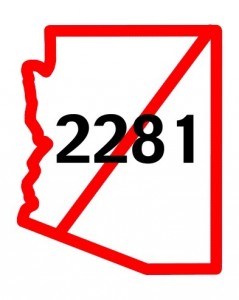Banning the R Word
 Imagine a classroom where it is illegal to discuss racism, its history and its impact, or fundamental concepts like ethnic solidarity and racial inequalities. Since January 2011, the state of Arizona has regulated the teaching of ethnic studies in the K-12 curriculum, mandating that teachers discuss ethnicity in relation to individual attributes rather than group conflict.
Imagine a classroom where it is illegal to discuss racism, its history and its impact, or fundamental concepts like ethnic solidarity and racial inequalities. Since January 2011, the state of Arizona has regulated the teaching of ethnic studies in the K-12 curriculum, mandating that teachers discuss ethnicity in relation to individual attributes rather than group conflict.
In addition to outlawing curricula that “advocates ethnic solidarity,” Arizona House Bill 2281 restricts instructional material that promotes “the overthrow of the United States government,” “resentment toward a race or class of people,” or even material “designed primarily for pupils of a particular ethnic group.”
As a consequence, in January 2012 the Tucson Unified School District removed dozens of books from its classrooms, including scholars Richard Delgado and Jean Stefancic’s Critical Race Theory, historian Howard Zinn’s A People’s History of the United States and playwright Wil liam Shakespeare’s The Tempest.
The law may pose problems for the dissemination of sociological work in public school classrooms. Works that explore the social construction of ethnic solidarity, like Tomás Jiménez’s 2010 book Replenished Ethnicity: Mexican Americans, Immigration and Identity or Eric Fong’s March 2010 American Journal of Sociology article, “Ethnic Solidarity for Economic Survival: Korean Greengrocers in New York City” may be perceived very differently by educational administrators interested in upholding Arizona’s educational reform.
While the long-term impact of the law is uncertain, sociologists have long debated the implications of “color-blind” policies that avoid explicitly addressing race. As Eduardo Bonilla-Silva, in his 2006 book Racism without Racists argues, such policies reinforce racism in subtle ways—in the case of HB 2281, by removing critiques of white privilege from the classroom.
Sociologist Amy Binder’s 2006 book Contentious Curricula contends that curricular battles such at this one reveal a great deal about social tensions in the United States. In this case, what is driving the Arizona bill are fears of Latino population growth.
Tucson’s school board sent a clear message that they believe Mexican-American Studies is anti-American. But by prohibiting such discussions, we may be perpetuating the very disharmony we seek to circumvent.
